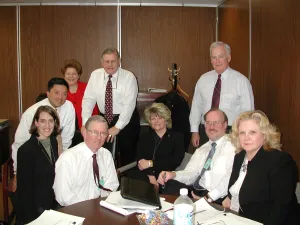
Francine Kerner can give a master class in being professionally underestimated because of her gender.
As a woman entering the legal profession in the early 1970s, shattering the glass ceiling wasn’t a realistic aspiration; getting a foot in the door was. Having graduated from a law school where women were represented—but in small numbers—she sought a position as a prosecutor in a big city office.
Kerner’s account of her interview for a trial attorney position with the District Attorneys’ Office in Kings County, Brooklyn, New York, seems unthinkable today.
“I asked how many women were in the office,” Kerner recalled. “The District Attorney said he didn't ‘know and didn’t give a s&*%.’ Later, he asked me if I believed ‘in using womanly charm.’ I guess I wasn't using ‘charm’ enough during the interview, but I mustered a girlish laugh and he continued with other questions. I knew enough not to object; not if I wanted the job.”
Despite the prevailing attitude of the times, Kerner was hired that day and went on to prosecute some of the country’s most dangerous felons, ending her term as an Assistant District Attorney in the Major Offenses Bureau.
“It was an intense period in my career,” said Kerner of the work. “I felt I was doing something very important, helping people who had been the victims of serious crimes and getting violent offenders off the street.”
But she was bothered that no women were assigned to serve in the Homicide Bureau. “I had an equivalent win-loss record of any male prosecutor,” said Kerner. “All the men who had the record I had went to the Homicide Bureau, but when I asked about it, a manager told me, ‘We want something different from our women than we want from our men.’”
“He said, ‘A woman wouldn’t be able to stand the sight of a dead body. Or work with homicide detectives. Or convince a jury to convict in a homicide case.’ Like that was so pleasant or easy for the men,” Kerner said with the slightest tinge of sarcasm. It was only years after Kerner left the D.A.’s office for Washington D.C. that women began handling the county’s murder cases.
But the results in the cases Kerner had taken to trial won the respect of the District Attorney who hired her. Running into her in an elevator just before she left the D.A.’s office for the Department of Commerce, he told her she was welcome to come back anytime. Kerner remembered he took hold of both of her hands and said, “‘Francine, I want you to know that if it doesn’t work out in Washington, you always have a job with me.’” It was his way of acknowledging her contributions.
The question of gender equity followed Kerner to the Department of Commerce.
A personal invitation from Mary Bass, President Carter’s 1979 nominee as the first Inspector General for Commerce, reunited the two women in the stand-up of that office. Kerner considered Bass a mentor after interning for her at the New York University School of Law and at the New York City Board of Higher Education. A congratulatory call from Kerner to Bass on her nomination turned into a job offer for Kerner, as Bass had already planned to ask her to join the Department of Commerce.
“The first week I was at Commerce, a male lawyer walked up to me and he said, ‘You know, you and your boss only have your jobs because you are women,’” said Kerner. She was quick to respond. “’That may be, but if so, the Department has lucked out despite itself.’”
By then Kerner had gained the toughness that comes from representing the state at trial, effectively handling interactions with police, victims, witnesses, defense counsel, defendants, judges and juries to gain hard-fought convictions. She felt confident that her gender would not stand in the way of success even if she lacked federal experience to start.
Her litigation skills also set her apart from her government law colleagues in a way she didn’t fully appreciate at the outset of her federal service. Her trial experience equipped her to assess issues from an evidentiary perspective, to command a room and persuasively argue a point. Kerner realized that because of her trial experience, “I was much more willing to take matters to court than many colleagues who lacked the same experience. It helped me negotiate better resolutions in many different venues.”
By the time Kerner was tapped to head the legal shop at TSA in 2002, blatant gender discrimination was all but absent from her experience. More women had entered the workforce and social norms had slowly changed the way women were viewed in the workplace. “I was resilient,” said Kerner matter-of-factly. “Over my career I have had a lot of wonderful bosses: men and women who have hired me for important jobs and promoted me. Even during periods of difficulty, I’ve always stayed focused on the mission and worked hard.”
It’s a trait she absorbed from her father, an attorney and small business owner of a surgical appliance store on historic Union Square in New York City. “Shimmy,” as he was called, was Kerner’s work ethic and social justice standard-bearer, and one of her most strident professional supporters. “And that was unusual for that time,” said Kerner, “because many women felt they were discouraged from achieving as much as they could. My father always recognized my intellect and always insisted that I do well academically and at work.”
As a native New Yorker working at the Department of Treasury on 9/11, Kerner vividly recalls the surreal feeling she had as she noticed smoke rising from the Pentagon. She marked her law school graduation and the night before her wedding with celebratory events at the Windows on the World restaurant and event venue atop the North Tower. Her brother worked just blocks away and survived the attacks, but Kerner was shaken.
“I had two children. One was in grade school and one was in high school,” said Kerner of the confusing time. “I didn’t know if our way of life would ever return to what it was.”
On 9/11, Kerner’s new-fangled cell phone connected her to her husband who had a fuller picture of the unfolding events. She heeded his warning to evacuate, but the next day, when the dust literally settled, she returned to work to take part in the response. As the Deputy Assistant General Counsel for Enforcement, she was responsible for unifying the Treasury’s position on proposed provisions of the USA PATRIOT Act.
Soon thereafter Kerner was tapped by John Magaw, TSA’s first Administrator, to oversee the legal side of building the agency, which was the largest civilian mobilization of the federal government since WWII. The legal staff she rapidly assembled was a driving force in helping to shape the agency. “We’ve always had a big role in helping to craft, defend, and enforce the policies that further transportation security.”
What I Do Matters
“Administrator David Pekoske, recently told me, ‘The legal team is a wonderful enabler and architect of TSA’s operational performance.’ Since TSA’s inception, attorneys have provided essential legal and policy advice to advance the agency’s security mission. Whether it’s contracting, personnel, standard operating procedures, enforcement, cybersecurity, vetting or pay parity, everything TSA does is supported by its legal team.
“TSA attorneys are located at major U.S. airports, regional mission support centers and TSA’s Head-quarters in Springfield, Virginia. Wherever they work, TSA attorneys train and advise our clients on law and policy, and ably represent the agency’s interests in a multitude of venues, including administrative forums, courts and Congress. We are guided by TSA’s mission: protecting the nation’s transportation systems to ensure freedom of movement for people and commerce.”
By Karen Robicheaux, TSA Strategic Communications and Public Affairs




